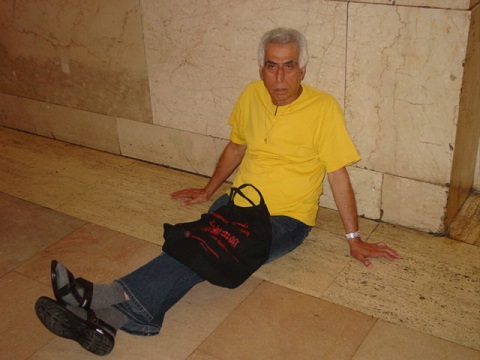|

Saadi Youssef
Translated by Khaled Mutawa
Thousands and thousands of events occur in a lifetime. I mean in this life, which is mostly exhausting and painful, and only free and joyous every now and then.
It is in the nature of the sons of Adam that their minds can only store so much and that they are limited to a certain scope. One suppresses many incidents and facts, and then completely forgets what he has suppressed.
But there are some things that are never forgotten:
The face of the mother.
The name of one's firstborn child.
The color of the first beloved's eyes.
Etcetera.
There is more that is not forgotten, but it is like the dark side of the moon.
For example:
Being subjected to a mock execution.
*
In February 1963, I was in Basra, just returning from Baghdad.
Basra was under the control of the Baathist usurpers and the militia, dubbed the National Guard, which was armed with a mixture of Egyptian Port Said rifles, British Astons, and other light weaponry.
This militia had positions all over the city, the main squares, residential neighborhoods, and markets. And it had a free hand to arrest people,
torture or even kill them like stray dogs.
*
The so-called National Guard arrested me and brought me to their headquarters, near the Shatt al-Arab. They had taken over the Economists Association building, a professional organization that, a day before the Baathist coup, was run by Basra's communists.
The Economists Association was overflowing with young Baathists armed with rifles that could go off at any moment, as the safeties had been removed from them.
The building was also filled with detainees who were packed in a hall not far from the main street and the riverbank.
*
The next day, I was moved to a narrow room that had a bamboo chair in it.
At night a guard came to me.
"I will keep the door open," he said. "I will not close it. The corridor is in front of you, and it leads to the street. You might think of running away."
"You can try," he added, "but I will shoot you."
*
I spent my night in that little room.
I was tired. I slept a deep sleep.
*
The following day, an hour or so before noon, the commander of the headquarters arrived. I remembered that his name was Fathi, and that he owned a shoe shop in the Indian market in Basra. Fathi was proudly sporting a Port Said rifle, and he was dressed in the latest style.
He tied my hands to the back of the chair.
Then he blindfolded me.
My wristwatch fell to the ground; I heard the thunk of its impact on the floor.
Fathi ordered the door to be closed. I heard the door close.
He said quietly: "We will execute you!"
"Do you have anything to tell us?"
I was to weak to even the think of answering him.
He said: "So, you have nothing to say!"
Then I heard the sound . . .
A stream of bullets
thundered all at once.
*
I did not die.
And as Badr Shaker Al-Sayyab said in his famous poem "Christ after the Crucifixion":
Therefore
I did not die.
*
A few days ago I read an account by my friend Wassif Shannon (who is in Australia now) of the hardship he faced after the 1991 uprising in southern Iraq, when he was a detainee in a camp run by the Iranian organization Mujahidi Khalq, and how they used to
cover the heads of detainees with black bags to execute them.
They covered his head more than once, in mock executions.
Wassif Shannon has been in Australia for nearly twenty years, but he has not forgotten what he has been through.
Therefore, there are things from the dark side of the moon that also cannot be forgotten.
London, 25.12.2015 |